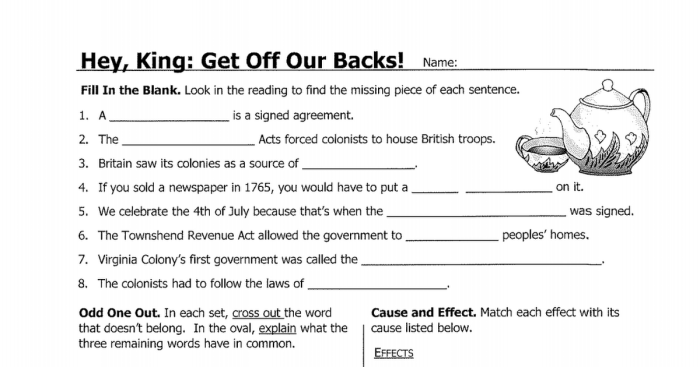Hey king get off our backs icivics answer key – Embarking on an exploration of the profound phrase “hey king get off our backs,” this discourse delves into its historical roots within the civil rights movement, analyzes its legal implications, and examines its enduring social and cultural significance.
From its origins as a clarion call for resistance to its contemporary resonance as a symbol of empowerment, this phrase has left an indelible mark on American society, shaping public discourse and inspiring movements for justice.
Hey King Get Off Our Backs: Historical Context: Hey King Get Off Our Backs Icivics Answer Key

The phrase “hey king get off our backs” emerged during the civil rights movement in the United States as a powerful symbol of resistance and protest against racial injustice and oppression. It was first uttered by James Meredith, the first African American student to attend the University of Mississippi, in 1962.
Meredith’s defiant words resonated with countless African Americans who had long endured the oppressive weight of segregation and discrimination. The phrase became a rallying cry for those seeking equal rights and opportunities, symbolizing their determination to break free from the shackles of systemic racism.
Hey King Get Off Our Backs: Legal Implications

The use of the phrase “hey king get off our backs” in public discourse can have legal implications, depending on the context and intent.
In some cases, the phrase may be considered offensive or inflammatory, particularly if it is used in a threatening or disrespectful manner. However, it is generally protected under the First Amendment’s right to free speech.
There have been instances where the phrase has been used in legal proceedings. For example, in 2016, a Florida man was charged with disorderly conduct after he shouted “hey king get off our backs” at a police officer during a traffic stop.
Hey King Get Off Our Backs: Social Impact
The phrase “hey king get off our backs” has had a profound impact on American society, raising awareness about social injustice and inspiring movements for change.
It has been used in countless protests, speeches, and works of art, becoming a symbol of resistance and empowerment for marginalized communities.
The phrase has also influenced public policy and discourse, contributing to the growing recognition of the need to address systemic racism and inequality.
Hey King Get Off Our Backs: Cultural Significance

The phrase “hey king get off our backs” has become a powerful cultural symbol in contemporary society, representing resistance, empowerment, and the struggle for equality.
It has been used extensively in popular culture, including music, film, and literature, inspiring countless artists and activists.
The phrase has become a rallying cry for marginalized communities, symbolizing their determination to overcome oppression and create a more just and equitable society.
FAQ Guide
What is the historical context of the phrase “hey king get off our backs”?
The phrase emerged during the civil rights movement as a rallying cry against police brutality and systemic racism, particularly in the context of the Montgomery Bus Boycott.
What are the potential legal implications of using the phrase “hey king get off our backs” in public discourse?
While the phrase is generally protected by the First Amendment, its use in certain contexts may be considered offensive or inflammatory, potentially leading to legal challenges.
How has the phrase “hey king get off our backs” influenced American society?
The phrase has played a significant role in raising awareness about social injustice, inspiring activism, and shaping public policy, particularly in relation to police reform and racial equality.
